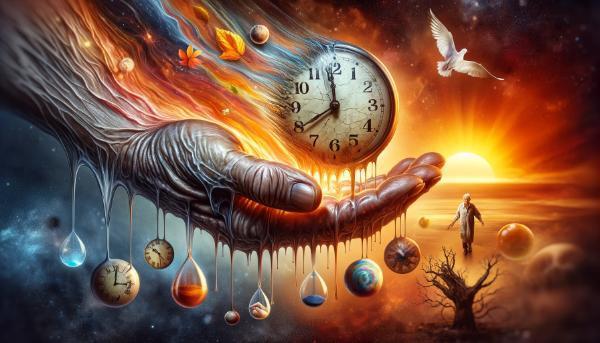The feeling that time goes faster as we grow older is universal among humanity. “Every day is getting shorter”… “Last year flew by”… “Ten years ago feels like yesterday”… “Life seems to slip away”… Who hasn’t used such and countless similar clichés to express one’s despondency before the excruciating inevitability of a seemingly ever-accelerating journey toward self-expiry?
So prevalent indeed is this feeling that it has even given rise to a range of silly conspiracy theories claiming that they (they being whichever malicious actors aren’t we in each respective case) applied secret advanced technology to speed time up for whatever nefarious purposes.
Follies aside, why can we all swear that time moves faster in spite of our rigorous intuition of temporal consistency? An attractive answer: Because of what I call the perceptional relativity of time.
This proposed concept has nothing to do with Einstein’s theories of special and general relativity. These theories explain how time actually slows down at higher speeds and stronger gravity, respectively, and belong to the realm of physics. In our planet’s constant conditions of cosmic speed and gravity, they are irrelevant to how we perceive time.
The perceptional relativity of time falls within the scope of psychology, in particular the broad field of time perception. Also known as chronoception, this discipline studies how humans (or animals for that matter) perceive time subjectively based on varying mental, physiological, and environmental factors. The most obvious example of this subjectivity is how we perceive the passing of time differently depending on our emotional state: When we are happy, time flies; when we suffer, time grinds to a halt.
The perceived acceleration of time that comes with age is, of course, recognized and pondered within the field. A number of theories have been proposed to explain the phenomenon. Some attribute it to biochemical reasons, such as decreased dopamine levels in the aging brain. Others, to neurological: This rationale maintains that, in a chronic manifestation of neural adaptation, older individuals tend to experience time faster than younger ones because their stimuli become steadily less novel and more routine and hence unnoticed, thus disengaging from the present and missing out on it; you probably can remember in fine detail your first day in school, your first day at work, the first time you saw the sea, your first kiss, the novelty of any thrilling or harrowing experience whatsoever… but you hardly have registered at all any of the untold mundane episodes in a stream of repetitious reenactment.
While these and several other factors may contribute to the age-related contraction of time, I believe its most fundamental, constant, and inalienable cause is the perceptional relativity of time. The idea stems from the fact that we humans are fitted to evaluate physical quantities exclusively by comparison. Nothing is inherently big or small, long or short, heavy or light, warm or cold, bright or dark if not juxtaposed with something else.
For example: When you’ve grown up in a village and for the first time visit your provincial capital, you are bound to perceive it as a large city; but if you’ve grown up in a metropolis, the same provincial capital will appear as a little town. Similarly, a Hercules beetle is a huge insect and a tiny creature at the same time. Likewise with time: 30 minutes would be too short a length for a film but too long for a film trailer; a century is practically infinite to neuroscience and irrelevantly infinitesimal to cosmology.
When now we attempt an objective assessment of a quantity, outside the context of direct contrast to another particular quantity or the average of a category of akin quantities, we intuitively refer to our own entity for a comparison. Objectively, small is what is smaller than our body, and big is what is bigger than our body; light is that we can lift, and heavy that we cannot lift; cold is below 37°C, and warm is above it; dark is darker and bright is brighter than our eyes’ optimal luminosity level…
The case of time is a bit more abstract. Our sole concrete biological point of reference to appraise a duration is the total time we have experienced. Just like the subjective value of $1 is drastically different between a kid with $10 in her piggy bank and an adult with $100,000 in her bank account, the subjective value of a day or a year depends on the amount of time one has deposited in one’s life-to-date. When you are ten years old, twenty years into the future are double your lifetime: a long time. When you are forty, the same twenty years are half your life: quite shorter.
With this logic, we can appreciate not only that time feels surely and positively faster as we get older, but precisely how faster it feels, too. One’s subjective perception of time is inversely proportional to one’s objective duration of life. Ceteris paribus, time feels twice as fast with every doubling of our age.

